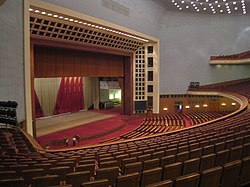2007 Chinese Communist Party conference
The 17th National Congress of the Chinese Communist Party was held in Beijing, China, at the Great Hall of the People from 15 to 21 October 2007. Congress marked a significant shift in the political direction of the country as CCP General Secretary Hu Jintao solidified his position of leadership. Hu's signature policy doctrine, the Scientific Development Concept, which aimed to create a "Socialist Harmonious Society" through egalitarian wealth distribution and concern for the country's less well-off, was enshrined into the Party Constitution. It was succeeded by the 18th National Congress of the Chinese Communist Party.[1]
The Congress also set up the political scene for a smooth transition to the fifth generation of party leadership, introducing rising political stars Xi Jinping and Li Keqiang to the Politburo Standing Committee (PSC), the country's de facto top decision-making body. Vice-President Zeng Qinghong, an important ally of former General secretary Jiang Zemin, retired from the PSC. Party anti-graft chief Wu Guanzheng, and Legal and Political Commission chief Luo Gan also retired due to age, replaced by He Guoqiang and Zhou Yongkang in their respective posts.
